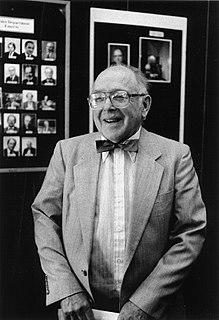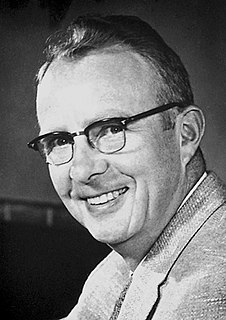A Quote by Paul Saffo
If you look at the last 150 years, about every 30 years or so, a new scientific discipline emerges that starts spinning out technologies and capturing people's imaginations. Go back to 1900: That industry was chemistry. People had chemistry sets. In the 1930s, it was the rise of physics and physicists. They build on each other. Chemists laid the experimental understanding for the physicists to build their theories. It was three physicists who invented the transistor in 1947. That started the information revolution. Today, kids get computers.
Quote Topics
Related Quotes
I don't. We've had three technological revolutions that have changed the course of human history, all driven by physics. In the first, the industrial revolution, physicists developed Newtonian mechanics and thermodynamics, which gave us the steam engine and machine power. The second technological revolution was the electricity revolution. That gave us radio, television, and telecommunications. Then, physicists developed the laser and the transistor.
Physicists only talk to physicists, economists to economists-worse still, nuclear physicists only talk to nuclear physicists and econometricians to econometricians. One wonders sometimes if science will not grind to a stop in an assemblage of walled-in hermits, each mumbling to himself words in a private language that only he can understand.
I now want to tell three stories about advances in twentieth-century physics. A curious fact emerges in these tales: time and again physicists have been guided by their sense of beauty not only in developing new theories but even in judging the validity of physical theories once they are developed. Simplicity is part of what I mean by beauty, but it is a simplicity of ideas, not simplicity of a mechanical sort that can be measured by counting equations or symbols.
Over the last century, physicists have used light quanta electrons, alpha particles, X-rays, gamma-rays, protons, neutrons and exotic sub-nuclear particles for this purpose. Much important information about the target atoms or nuclei or their assemblage has been obtained in this way. In witness of this importance one can point to the unusual concentration of scattering enthusiasts among earlier Nobel Laureate physicists. One could say that physicists just love to perform or interpret scattering experiments.
It is quite true that many scientists, many physicists, maintain that the physical constants, the half dozen or so numbers that physicists have to simply assume in order to derive the rest of their understanding ... have to be assumed. You can't provide a rationale for why those numbers are there. Physicists have calculated that if any of these numbers was a little bit different, the universe as we know it wouldn't exist.
When chemists have brought their knowledge out of their special laboratories into the laboratory of the world, where chemical combinations are and have been through all time going on in such vast proportions,-when physicists study the laws of moisture, of clouds and storms, in past periods as well as in the present,-when, in short, geologists and zoologists are chemists and physicists, and vice versa,-then we shall learn more of the changes the world has undergone than is possible now that they are separately studied.
Whenever I want to represent or depict the official version, I will refer to them as 'mathematicians' or 'mathematical physicists' or idiots or something like that. There are no physicists in mainstream 'Physics.' From Newton to Einstein to Hawking, they are all just mathematicians as far as Science and Physics are concerned.
I'm convinced that a controlled disrespect for authority is essential to a scientist. All the good experimental physicists I have known have had an intense curiosity that no Keep Out sign could mute. Physicists do, of course, show a healthy respect for High Voltage, Radiation, and Liquid Hydrogen signs. They are not reckless. I can think of only six who have been killed on the job.
Chemists are, on the whole, like physicists, only 'less so'.They don't make quite the same wonderful mistakes, and much what they do is an art, related to cooking, instead of a true science. They have their moments, and their sources of legitimate pride. They don't split atoms, as the physicists do. They join them together, and a very praiseworthy activity that is.
People will listen to sophisticated physicists, using God as a kind of metaphor for the deep constants, the deep problems, the deep principles of physics, and say that in that sense I believe in God. The reaction is, "Oh, this great physicist believes in God - that means I'm free to believe in the trinity and in the crucifixion and in the reincarnation of Christ" - and all that stuff, which of course has nothing whatever to do with the fundamental constants of physics, which is what these physicists are talking about.
































